Call to Worship –
From Eliza Buchakjian-Tweedy, Pastor at First Church Congregational in Rochester, NH.
What does the Lord require of you?
To do justice, and to love kindness,
and to walk humbly with our God.
What does God command of us?
To love God with all our heart,
and all our soul,
and all our mind,
and all our strength,
and to love our neighbor as ourselves.
God does not call us to ease or to comfort.
But to presence, and abundance,
and grace in our struggle.
Let us worship the God who believes in us,
and trusts in us, and abides with us.
Let us worship the God who will ask much of us,
but will be beside us every step of the way.
Prayer –
From Rev. John Creasy of The Open Door Presbyterian Church
Christian Trinitarian theology may be the most unique aspect of our faith. We believe in one God who is communal in nature. We believe in one God who is Father, Son and Holy Spirit. We believe in one God who is three as much as one. We believe in one God who is drawing all of creation unto God’s self, bringing community and unity through love.
In this time of racial injustice and unrest we pray that we might experience the grace and humbleness of God the Son. Help us to humble ourselves, even unto death, for the sake of our siblings. Lord, teach us to not strive for anything, but in all things humble ourselves, as you did through the incarnation and in your crucifixion. Give us your grace that we might always extend grace to others.
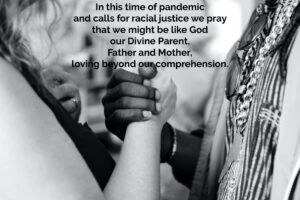
Through this love you birthed the universe, the vastness of galaxies and the preciousness of infants. Father God, teach us to embrace our siblings with the love that only a parent knows. Mother God, give us your patience to never give up on one another or the causes of justice in our world.
In this time fear and anxiety, Holy Spirit, commune with us. Equip us, strengthen us, convict us and encourage us toward becoming a more holy and complete church. We confess that we have pushed you aside, squelching your work within us because we are afraid of what a Spirit driven life will mean. We ask, Holy Spirit, that your power would be made known in your church and in your people. We pray that you would build the beloved community of God here in our midst.
Father, Son and Holy Spirit, give your church and all of your people, the community made known in the trinity. Help us love one another as we would have them love us back. Help us feed the hungry as we would want to be fed in our time of need. Help us comfort the mourning as only a loving parent can comfort. Help us heal the sick and lift up the broken-hearted, as you, the great physician of body and mind, would do.
Scripture Reading – Luke 10:25-37 (CEB)
25 A legal expert stood up to test Jesus. “Teacher,” he said, “what must I do to gain eternal life?”
26 Jesus replied, “What is written in the Law? How do you interpret it?”
27 He responded, “You must love the Lord your God with all your heart, with all your being, with all your strength, and with all your mind, and love your neighbor as yourself.”
28 Jesus said to him, “You have answered correctly. Do this and you will live.”
29 But the legal expert wanted to prove that he was right, so he said to Jesus, “And who is my neighbor?”
30 Jesus replied, “A man went down from Jerusalem to Jericho. He encountered thieves, who stripped him naked, beat him up, and left him near death. 31 Now it just so happened that a priest was also going down the same road. When he saw the injured man, he crossed over to the other side of the road and went on his way.32 Likewise, a Levite came by that spot, saw the injured man, and crossed over to the other side of the road and went on his way. 33 A Samaritan, who was on a journey, came to where the man was. But when he saw him, he was moved with compassion.34 The Samaritan went to him and bandaged his wounds, tending them with oil and wine. Then he placed the wounded man on his own donkey, took him to an inn, and took care of him. 35 The next day, he took two full days’ worth of wages and gave them to the innkeeper. He said, ‘Take care of him, and when I return, I will pay you back for any additional costs.’
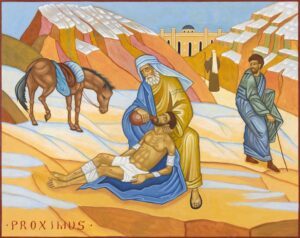
36What do you think? Which one of these three was a neighbor to the man who encountered thieves?”
37 Then the legal expert said, “The one who demonstrated mercy toward him.”
Jesus told him, “Go and do likewise.”
Meditation – By David Anderson
When was the last time someone truly noticed you?
Was it for a recent accomplishment? Was it an act of humility that someone just happened to get a glance at? Was it a performance of some sort? Possibly college sports, or a dance, or a musical performance? Have you posted something on social media and received praise for it? Was it a purchase you made? Have you been called a great friend, or a fantastic employee, or the best grandparent ever?
What does it feel like to be noticed?
From head to toe, what happens in your body when you are noticed? When you are seen?
I can recall several times in my life where I have been noticed for good. I can even recall when someone saw something in me and invited me into activities like leading groups, or worship, or preaching when I didn’t notice those skills within myself. It is an incredible feeling to be noticed. There is euphoria, energy, and the heart rate increases. It’s almost like coming alive anew.
For those of us with kids, we see this all the time. We are fortunate enough to have a pool at our home. On these hot days, the kids swim a lot. There is a constant refrain being shouted out, “Daddy watch! Dad look me!” It makes their day when Becky and I see what they are doing. When we pay attention to them they offer the biggest smiles. It may be the 30th pencil dive into the pool, but they want our focus. They long to be noticed by us.
Think about it.
Think about how good it feels to get noticed. And now ponder the converse.
How does it feel to go unnoticed?
Does the emotion have a direct correlation in the opposite direction?
Have you ever worked your tail off on a project or a performance and felt unseen? What did you feel in your body? Did your face become hot? Did you heart skip a beat? Did you clinch your jaw or fist?
Have you experienced the searing pain of being rejected, devalued, or taken advantage of? Have you been ignored? Ridiculed? What happened within your body?
Typically when I read the passage containing the story of the Good Samaritan, I summarize it as a call to compassion.
Or I reduce it to do the right thing even if it costs you. But I ran into a quote this week that shook me out of a slumber.
Rich Villodas, a pastor from New York, wrote this:
The Good Samaritan story is not just an example of compassionate spirituality. It is a critique against religious passivity. If church people won’t work for justice and mercy, God will find some other people who will.
You see, the priest and the Levite walk on by. They notice the injured man, but not in a way that moves them to action. Well that isn’t entirely true; they take action, but exactly the wrong kind. It is the Samaritan, the outsider, the downcast, and the despised that acts out Kingdom values.
When the church refused to do the work of God, God went elsewhere.
I admit to and repent of the fact that I have been passive most of my life. I hid behind my comforts, the system that took care of me at the expense of others, and ultimately ignored the humanity all around me that cried out to be seen, heard, and cared for.
I know many of us are in the process of deconstructing our racist, biased, privileged worldviews, and that work takes time. It doesn’t happen over night.
Many of us are trying to figure out the first step in the marathon that is before us. If I am really honest, much of my desire to do something right is to displace the guilt or accusations against me in my complicit passivity. I want it go away. But that isn’t how this works.
Instead, a more likely practice will be to repent, behave anew, listen, repent again, behave anew again, and listen again. We will all struggle and stumble as we try to advocate for the human dignity in the lives of people of color. We will mess up even when we have the greatest of intentions. But passivity is not an option. God will move on from us, and form a new church to do his work. He will always keep the door open for us to repent and get on board with God’s ministry, but he will move on without us. He won’t let us stop him from accomplishing his will.
There is a serious warning in the beloved passage above – a prophetic warning.
If we choose passivity when our neighbor cries out in agony, we may be betraying the fact that we do not actually love God all that much. Is it possible to love God with all you have, and not show mercy to your neighbor? I’m not so sure. For those of us who have ignored the cries, some centuries old, and other just weeks, days, or hours old, we would do well to love our neighbors. Passivity is no longer an option for those of us claiming to love God.
So where do we start?
What is the first step? As we move to a time of offering, I suggest several steps that we can take as a church.
Offering – Resist Passivity
Here are three action items as a response to the story of the Good Samaritan.
1) If you have children, began to talk to them in appropriate ways about racism in our nation.
Follow the link provided for suggested ways to appropriately discuss this issue with your children.
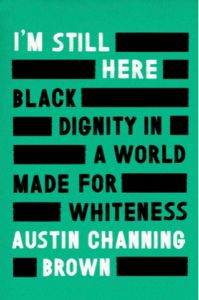 2) Learn from marginal voices and interrupt your default response of defensiveness.
2) Learn from marginal voices and interrupt your default response of defensiveness.
I just finished Austin Channing Brown’s book, I’m Still Here. It is a powerful memoir about her experience as an African American Christian living in America.
3) Begin to analyze your motivations for working towards justice.
Are you eager for recognition? Do you want to be praised or applauded for your actions? Instead, promote and uplift the voices of leaders, activists, and those who have been doing the hard work for years. Instead of trying to become an expert in a short amount of time to alleviate your own discomfort, slowly learn from the voices already available to us. The New York Times provides a bestselling list and it is currently full of books from minority voices.
Combined Print & E-Book Nonfiction
Prayer –
Adapted from Mark Young, President of Denver Seminary
Have mercy on me, O Lord.
I have blinded my eyes. In spite of the clear evidence of deeply embedded racism all around me, I have looked the other way. Too many have died. Too many have suffered. Too many have been locked out and cast aside. Too many indignities. Too many injustices. And still I looked the other way.
Have mercy on me, O Lord.
I have hardened my heart. Believing the lie that blacks have the same opportunities as whites, I could not allow myself to admit that my life was shaped as much by racism as theirs—mine to benefit and theirs to harm. But it was and it is and it will continue to be. I have cared too little. I have grieved too little.
Have mercy on me, O Lord.
I have silenced my tongue. My voice has not been raised in prophetic rebuke and anger. My feet have not stepped out for justice alongside those who have more courage than I. And in my silence I am an accomplice to bigotry.
Forgive me, O Lord.
I have sinned against you and against those who suffer the evil of racism. Indifference has smothered my soul and snuffed out fleeting impulses for reconciliation. I ask for your forgiveness and I will appropriately seek their forgiveness.
Empower me, O Lord.
I need your strength to step beyond blindness, indifference and fear; to step toward those whom I have sinned against. I make no grandiose promises or plans today for I know how easily these can be made and forgotten. But this I know. I cannot be the same. And I will not.
Amen!
Benediction
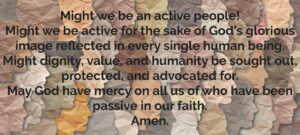



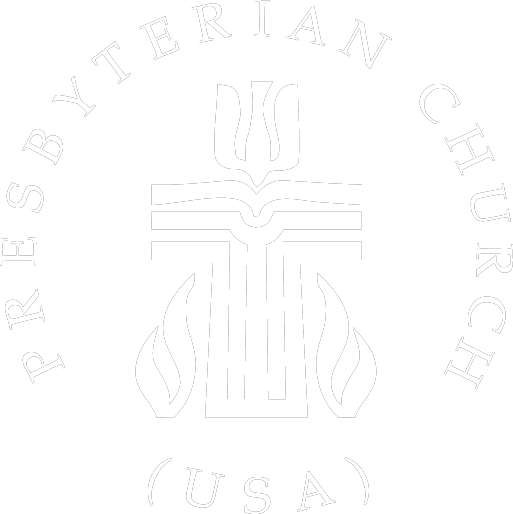
This was very pertinent and well said.
Thank you, David, for continuing to keep this issue of racism before us, that we may continue to repent of our past contributions to this issue.
I saw that Dr. Mark Young has written some pretty “dense” material. I found this on his web page:
How Anti Racism Hurts Black People – John McWhorter- on Youtube
Please read this commentary on the book “White Guilt” by Shelby Steele
Shelby Steele’s “A Bound Man,” but “White Guilt” really knocked me out. He describes white guilt as a self-serving effort by liberal whites to feel better about themselves, not to atone for a moral crime. Black militancy, he says, is an effort to profit from white guilt—much easier than assuming responsibility. Coming down against “social justice,” he regards it as a way of avoiding taking responsibility by depending on the largesse of whites. “And so we became slaves again, our fate the responsibility of others.” “The greatest black problem in America today,” he argues, “is freedom.” I liked his comparing black insufficiency in reading and writing with excellence in sports and entertainment. If the latter works, why can’t the former?
Steele offers an original take on both the history of race in America and the bifurcation of politics into liberal and conservative camps. He describes the cultural war as a war between the Right—grounded in principle and values—and the Left—focused on dissociation from America’s racist past. The American Right is enjoying a political and cultural ascendency, he says, because (1) the Left has “ceded its old territory—compassionate Jeffersonian liberalism—to the right, thereby ceding to it precisely the democratic principles and values of individual freedom and responsibility that have made America a great nation,” and (2) “today’s right understands that racism, sexism, and reckless militarism are morally wrong.”
He surprised me by complimenting George W. Bush’s reference to the “bigotry of low expectations.” Steele says Bush “offered a new theory: dissociation from the racist past through principle and individual responsibility rather than at the expense of these things.” Steele became a conservative because liberals asked him to believe in dissociation instead of “demanding principles as the road to black advancement.” He dislikes affirmative action because it provides an “incentive for mediocrity and a disincentive for excellence.” Favorite quote: “If I’ve learned anything in all of this, it is that if you want to be free, you have to make yourself that way and pay whatever price the world exacts.”
The Torah’s statement of the second commandment in today’s scripture is from Lev. 19:18:
“You shall not take vengeance or bear a grudge against any of your people, but you shall love your neighbor as yourself: I am the Lord.”
Jesus told the Good Samaritan story in response to the legal expert’s question: WHO is my neighbor?
In this story Jesus seems to extend the definition of neighbor to include aliens as suggested by Lev. 19:34:
“The alien who resides with you shall be to you as the citizen among you; you shall love the alien as yourself, for you were aliens in the land of Egypt: I am the Lord your God.” (For a perspective that categorizes Samaritans as aliens, see: 2 Kings 17:24-34.)
I think that Jesus is calling us to actually love people who are different from us—different race, different citizenship, or different customs. As David pointed out in his meditation, the kind of love Jesus was talking about is one of action.
Very thoughtful message(s). Seems to me that we need to look at working to make our society more just and loving, both on an individual level by our specific interactions with others and by our seeking and advocating greater justice and compassion in our institutions. If we see that anyone in society lacks the opportunities we have had, we should work to correct that. A child born in abject poverty will have a much harder time to experience life, liberty, and the pursuit of happiness. We are all Samaritans going about our daily business, but let’s allow ourselves to be distracted by the needs of others, depending on God to help us realize what we may usefully do to help. The wrath of man doesn’t work the righteousness of God, whether it is police wrath or rioter wrath. I am thankful that so much of the many demonstrations has been peaceful.
What a wonderful service! Two things really jumped out at me.
First, the reminder that when the church does not do the work of God, he goes elsewhere to get it done. In our story, it’s the Samaritan doing the work that could and should have been done by the priest and the Levite. In my life, it’s my non-Christian sister who has labored for years in Northern California, promoting reconciliation between whites and blacks in a place where the church has largely stood silent in the face of deep interracial mistrust.
Second, the reminder at the very opening call to worship that God trusts us. Think about that. God entrusts us with the Great Commission. God entrusts us with the job of praying for his kingdom to come and demonstrating to the unbelieving world what it looks like. And God entrusts us – who are so unworthy of his trust – with his precious Holy Spirit. To actually carry that Holy Spirit within our own bodies, which he astoundingly calls temples!
My response? First, shame and the need to confess that I have not taken seriously the mission he has given me. And that confession is directed not only at God, but also toward my sister. We have already begun the long conversation that I hope will reconcile us over a deep divide. Second, absolute delight that God still wants me on his gospel team and a renewed energy and commitment to be a part of his great plan of redeeming his creation.
“Hello, thank you Emmanuel for having the hard conversations and the protests.” written by -M-o-r-i-a-h